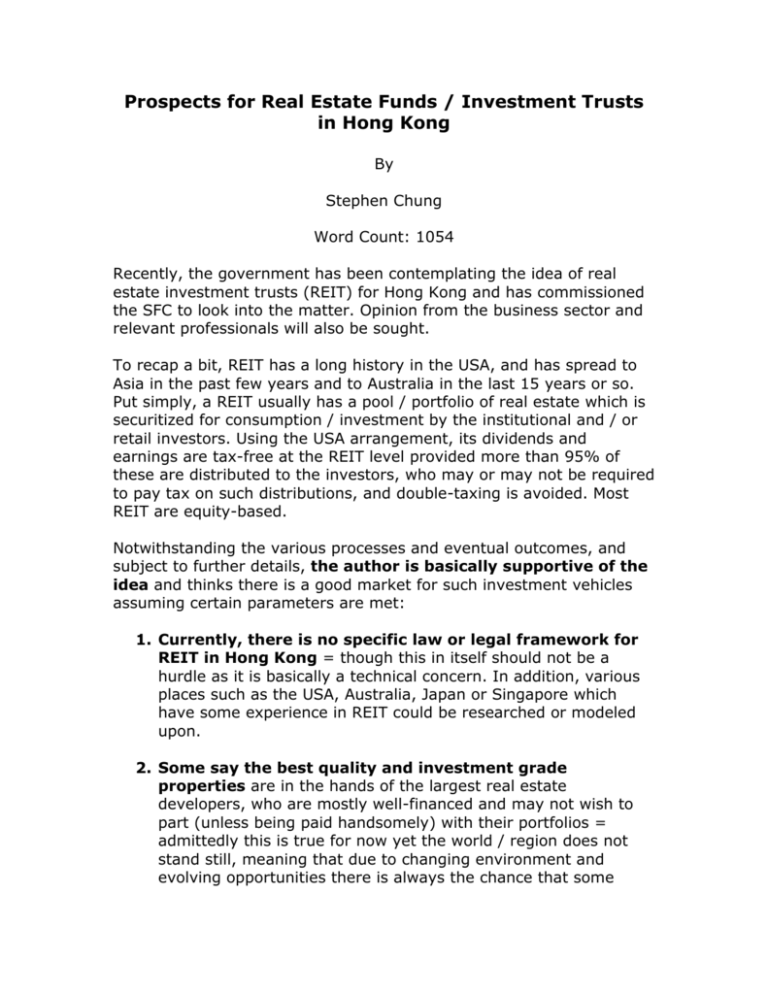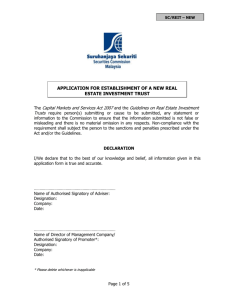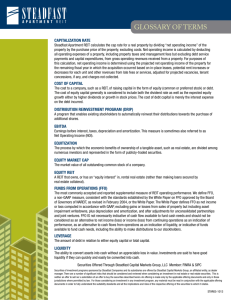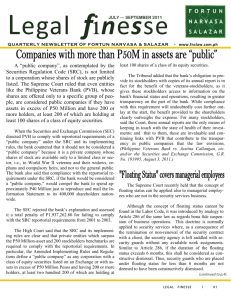
Prospects for Real Estate Funds / Investment Trusts
in Hong Kong
By
Stephen Chung
Word Count: 1054
Recently, the government has been contemplating the idea of real
estate investment trusts (REIT) for Hong Kong and has commissioned
the SFC to look into the matter. Opinion from the business sector and
relevant professionals will also be sought.
To recap a bit, REIT has a long history in the USA, and has spread to
Asia in the past few years and to Australia in the last 15 years or so.
Put simply, a REIT usually has a pool / portfolio of real estate which is
securitized for consumption / investment by the institutional and / or
retail investors. Using the USA arrangement, its dividends and
earnings are tax-free at the REIT level provided more than 95% of
these are distributed to the investors, who may or may not be required
to pay tax on such distributions, and double-taxing is avoided. Most
REIT are equity-based.
Notwithstanding the various processes and eventual outcomes, and
subject to further details, the author is basically supportive of the
idea and thinks there is a good market for such investment vehicles
assuming certain parameters are met:
1. Currently, there is no specific law or legal framework for
REIT in Hong Kong = though this in itself should not be a
hurdle as it is basically a technical concern. In addition, various
places such as the USA, Australia, Japan or Singapore which
have some experience in REIT could be researched or modeled
upon.
2. Some say the best quality and investment grade
properties are in the hands of the largest real estate
developers, who are mostly well-financed and may not wish to
part (unless being paid handsomely) with their portfolios =
admittedly this is true for now yet the world / region does not
stand still, meaning that due to changing environment and
evolving opportunities there is always the chance that some
developers may wish to dispose of some of their currently held
prime real estate in order to capture opportunities elsewhere etc.
It is reasonable to expect that a few developers may even use
the REIT vehicle to liquidate their assets.
3. The Hong Kong taxes are low and offer little incentives for
structuring a REIT = True though again, the world changes and
Hong Kong taxes should not be taken for granted (remember we
have been having government deficits!). Moreover, even a
saving of some 16% taxes could be enormous as REIT are likely
to be relatively sizable in terms of investment capital and
earnings.
Your humble author is optimistic of the REIT prospect because:
1. The population is graying = currently the average age is around
36 and is likely to rise given the demographic distribution and the
imminent retirement of the “baby-boomers”. People will tend to look
for relatively steady investments and REIT tend to buy established
properties with good rental yields etc, thus a potential good match.
Compared to bank savings and bonds, REIT offer some hope of capital
appreciation in addition to the rental income, thus kind of falling
between a bond and a real estate stock, which may include non-real
estate assets (i.e. a REIT is typically more focused on real estate) and
which earning distribution may be subject to the board (while REIT
distribute most earnings as mentioned above to keep the tax-free
status).
2. The MPF is growing = and REIT offer one more option for placing
such funds, notwithstanding the possibility of having to add / amend
some laws to suit.
3. Many middle class would like to invest in other regional real
estate markets especially the major cities in China yet may not wish to
spend large amounts on direct ownership and to have the trouble of
maintaining the bricks and mortar etc = your humble author does not
have any formal data on this nor has he performed a survey. Yet most
of his friends would consider such vehicles if good and well managed
ones are found. Nonetheless, it is not specifically known if the Hong
Kong REIT may invest in non-Hong Kong properties, though the
market appeal would be higher if regional markets could be included.
4. Hong Kong having the necessary and ready legal, financial
and marketing infrastructures, especially if China portfolios are
involved = Notwithstanding the views that Shanghai / Beijing are
improving fast, and that China is also looking into REIT herself etc,
your author thinks Hong Kong is still the best place and possibly the
only place where REIT could be run as far as China / regional markets
are concerned.
5. REIT, if adopted, are likely to fall under some form of
government-related monitoring = while it is important that items
like organization structure, accounting administration , earning
distribution, and the like be tightly monitored, the business or
investment decisions should be less so in order not to deplete
unnecessarily the flexibility and nimbleness required in today’s
investment environment.
Like other investments, no matter how well REIT are structured and
monitored, the performance of the various real estate markets
and properties that they invest in largely decides the performance of
the REIT themselves. Also, REIT will only become a significant part of
the overall real estate scene in the long run if the REIT involved are
responsibly and competently managed.
Notes: The article and/or content contained herein are for general
reference only and are not meant to substitute for proper professional
advice and/or due diligence. The author(s) and Zeppelin, including its
staff, associates, consultants, executives and the like do not accept
any responsibility or liability for losses, damages, claims and the like
arising out of the use or reference to the content contained herein.
Stephen Chung, Zeppelin Real Estate Analysis Limited, has over 15
years of experience in real estate development, investment,
management, marketing and consulting spanning across Hong Kong /
China, Asia and North America. He is a Chartered Surveyor by
profession and holds a Masters degree in real estate from MIT. Stephen
is also much sought after by universities and business associations as a
real estate guest speaker. He is currently an adjunct lecturer with the
City University of Hong Kong. Copyright© 2002, Stephen Chung. All
rights reserved. For additional information about Stephen’s
presentations, contact the Frog Pond at 800.704.FROG(3764) or email
susie@frogpond.com; http://www.frogpond.com












